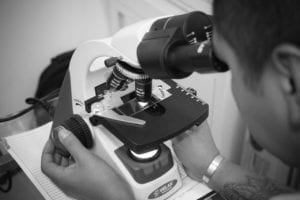Kennedy Disease
What is Kennedy disease?
Kennedy disease is a neuromuscular disorder. It is characterized by a progressive deterioration of the proximal and bulbar muscles. It affects mainly males, and it sees the onset of symptoms between the ages of 30 and 60.
What are the symptoms of Kennedy disease?
Kennedy disease is a progressive condition, so symptoms change throughout the course of the disease. Symptoms typically begin with tremors, muscle cramps, and twitching. As the bulbar and proximal muscles deteriorate, symptoms progress to muscle weakness and wasting. This effect can manifest in a variety of ways. Other symptoms include gynecomastia, testicular atrophy, and reduced fertility. The majority of people with this disease also have trouble speaking paired with an inability to produce voice sounds. People may also experience an abnormal gait.
What causes Kennedy disease?
This condition is inherited in an X-linked pattern, which is why it mainly affects males. In order for this disease to be present in females, both parents must pass down the affected gene on the X chromosome.
The affected gene is the androgen receptor gene. Androgens are hormones that are necessary for normal male sexual development, and this gene allows the body to respond appropriately to hormones.
How is Kennedy disease diagnosed?
A diagnosis is often attained through an examination of family and medical history, symptoms, lab tests, and a physical exam. A diagnosis is confirmed through genetic testing.
What are the treatments for Kennedy disease?
No cure exists for this disease. Treatment is symptomatic and meant to retain function of the muscles. Physical therapy along with rehabilitation help to maintain use of the muscles. Braces and walkers may also aid in mobility. Surgery is a possible treatment for gynecomastia. Anti-androgens may also be a helpful treatment for some symptoms of this disease.
As the deterioration of the bulbar muscles progresses, it is important that people cut their food into small pieces and avoid items that could be hard to swallow. Complications such as asphyxiation and aspiration pneumonia may occur and can be life-threatening. Monitoring and instant treatment of these conditions should occur.
Where can I find out more about Kennedy disease?
Kennedy Disease Articles




